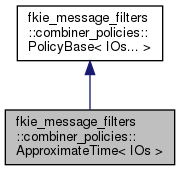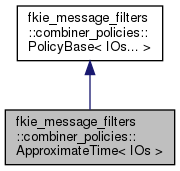Approximate time policy. More...
#include <fkie_message_filters/combiner_policies/approximate_time.h>


Public Types | |
| using | EmitterCB = std::function< void(const OutgoingTuple &)> |
| Callback for assembled outputs. | |
| using | IncomingTuples = std::tuple< helpers::io_tuple_t< IOs >... > |
| Tuple type of incoming data tuples. | |
| using | OutgoingTuple = helpers::io_tuple_t< helpers::io_concat_t< IOs... > > |
| Combined tuple type for data output. | |
Public Member Functions | |
| ApproximateTime () | |
| Constructor. More... | |
| ApproximateTime & | set_max_age (const ros::Duration &max_age) noexcept |
| Set maximum age of any data in the queue. More... | |
| ApproximateTime & | set_max_queue_size (std::size_t queue_size, const boost::optional< ros::Duration > &max_age=boost::none) noexcept |
| Set maximum queue size. More... | |
| ApproximateTime & | set_max_timespan (const ros::Duration &max_delta) noexcept |
| Set maximum permissible timestamp difference of matched messages. More... | |
| ApproximateTime & | set_min_distance (std::size_t i, const ros::Duration &min_dist) noexcept |
| Set the minimum distance between consecutive messages on a source. More... | |
Protected Types | |
| using | MaybeOutgoingTuples = std::tuple< boost::optional< helpers::io_tuple_t< IOs > >... > |
| Tuple of outgoing tuple candidates. More... | |
Protected Member Functions | |
| template<std::size_t N> | |
| void | add (std::unique_lock< std::mutex > &, const std::tuple_element_t< N, IncomingTuples > &) |
| Input function. More... | |
| void | emit (const OutgoingTuple &out) |
| Emit data. More... | |
| void | reset () noexcept override |
| Reset internal state. More... | |
| void | set_emitter_callback (const EmitterCB &) noexcept |
| Set output function. More... | |
Detailed Description
template<typename... IOs>
class fkie_message_filters::combiner_policies::ApproximateTime< IOs >
Approximate time policy.
This is a policy for the Combiner class. It will associate data from the connected sources, but unlike ExactTime, it can match messages even when their ROS header timestamps do not match perfectly. If an input source is not unary, only the first argument will be examined to determine the timestamp. It must have an accessible ROS header, which is determined using the ros::message_traits template.
The policy employs a modified version of the ROS ApproximateTime algorithm. Like its predecessor, the algorithm is not merely applying an epsilon to account for time differences, but tries to find the best possible match. Each set of grouped messages which are output by the policy, satisfies the following criteria:
- Each message is used only once. Two sets will never share the same message, but some messages can be dropped.
- Messages are used in order. Unlike the original algorithm, we do not guarantee that sets as a whole do not overlap, but we guarantee that for each topic, messages will be used in time stamp order. We found that revising this criterion improves match quality for high-frequency topics, such as stereo vision systems with depth images, in the presence of transient jitter.
- Sets are contiguous. This means that you cannot form a valid set from the dropped messages.
- Sets have minimal timespan. This means that the time stamp difference among messages in a set cannot be smaller without violating the previous property.
- The output only depends on the time stamps, not on the arrival time of messages. The messages have to arrive in order on each topic, but not necessarily across topics, as long as the queue size is large enough to accommodate for the differences.
Optional parameters:
- Set timespan: the time difference of two messages in the same set will never exceed this value. By default, the policy does not constrain the timespan. If you set this value, the policy will avoid "wasting" messages in sets which are ultimately rejected anyway. Oftentimes, this will give you more valid sets in total.
- Message distance: if messages of a particular topic cannot be closer together than a known interval, providing this lower bound will not change the output but will allow the algorithm to conclude earlier that a given set is optimal, thereby reducing output lag. The default lower bound is zero. An incorrect lower bound will result in suboptimal sets being selected.
The algorithm works as follows:
- Wait until each input queue has at least one message available.
- Pick the latest message among the heads of all queues, which is going to be the pivot. The pivot belongs to every set that is contiguous to the previous set, so it must belong to the newly formed set.
- For all other input queues except the pivot, advance to the next message until the time difference to the pivot message is minimal. Proving optimality depends on the minimum message distance and the fact that on every topic, messages will arrive in time stamp order. If any queue is exhausted and, at least theoretically, the next message could still be closer to the pivot, wait for the next message to arrive.
- Once all input queues have reached their optimum, send the resulting set. If the set violates the user-specified timespan constraint, drop the pivot element instead, and restart from scratch with the remaining messages.
- If messages arrive out of order (i.e. a message on a topic has a time stamp that is earlier than the previously received one), all queues are flushed and the policy restarts from scratch.
- If messages need to be dropped because the maximum queue size or the message age limit is exceeded, the pivot element is chosen again from the new queue heads. By default, the policy will buffer arbitrary many messages for at most one second.
Member Typedef Documentation
◆ MaybeOutgoingTuples
|
protectedinherited |
Tuple of outgoing tuple candidates.
This is basically a tuple of optionals, so elements can remain empty until a suitable data element has been found by the policy.
Constructor & Destructor Documentation
◆ ApproximateTime()
| fkie_message_filters::combiner_policies::ApproximateTime< IOs >::ApproximateTime | ( | ) |
Constructor.
- Exceptions
- Does not throw any exceptions.
Member Function Documentation
◆ add()
|
protected |
Input function.
This function will be called by the Combiner class for incoming data.
◆ emit()
|
protectedinherited |
Emit data.
This returns combined data back to the Combiner class.
◆ reset()
|
overrideprotectedvirtualnoexcept |
Reset internal state.
This function is called by the Combiner if the filter is reset.
Implements fkie_message_filters::combiner_policies::PolicyBase< IOs... >.
◆ set_emitter_callback()
|
protectednoexceptinherited |
Set output function.
This function is called by the policy whenever it has output ready to be passed on.
◆ set_max_age()
|
noexcept |
Set maximum age of any data in the queue.
This is equivalent to
max_agemaximum age
- Exceptions
- Does not throw any exceptions.
◆ set_max_queue_size()
|
noexcept |
Set maximum queue size.
queue_sizemaximum queue size per slot (zero means unlimited)max_agethe maximum age of any data in the queue (nonemeans unlimited)
- Exceptions
- Does not throw any exceptions.
◆ set_max_timespan()
|
noexcept |
Set maximum permissible timestamp difference of matched messages.
max_deltathe maximum permissible timestamp difference of matched messages
- Exceptions
- Does not throw any exceptions.
◆ set_min_distance()
|
noexcept |
Set the minimum distance between consecutive messages on a source.
If it is known in advance that messages from a certain source cannot arrive closer together than min_dist, the policy can conclude earlier that a set of matched messages is optimal, thereby reducing the introduced lag. A typical example would be a camera with fixed frame rate F, where the minimum distance between consecutive messages can be assumed to be at least 0.5/F.
ithe input source slotmin_distthe minimum temporal distance between consecutive messages
- Exceptions
- Does not throw any exceptions.
The documentation for this class was generated from the following file:
- include/fkie_message_filters/combiner_policies/approximate_time.h
 1.8.13
1.8.13